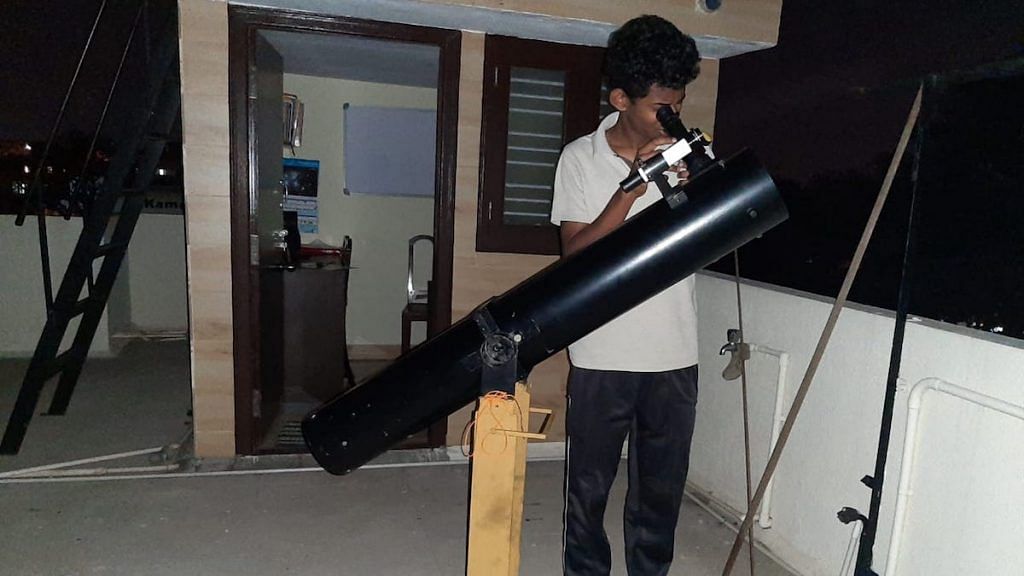If the world has changed in the last one year because of Covid, so has the lives of those who look beyond this world — members of the astronomers’ clubs of Bengaluru.
The Association of Bangalore Amateur Astronomers (ABAA) has met religiously every Sunday since 1976. But the club had to close for the first time from March to November in 2020 due to the pandemic. And then again in April 2021, when ABAA had to shut down due to the rising Covid-19 cases in Bengaluru.
“Astronomy helps you be calm in this chaotic world,” says Ravindra Aradhya, president of ABAA.
Now ABAA hosts Skype meetings — a terrain it has never explored before. The sky is on Skype. It is amusing to see a bunch of brilliant amateur astronomers who can read the galaxy fumble over digital technology.
“This was a giant leap for us and wouldn’t have happened without the lockdown,” admits Ravindra.
Life has changed for Bengaluru’s amateur astronomers between the two waves of Covid — but their passion for science and their club has endured the virus.
Also read: How vast is the universe? ‘Cosmic Zoom’ helps you explore this from the comfort of your mobile
Sky on Skype, moon with mask
Every Sunday, ABAA members discuss a topic on Skype — from astrophotography to Mars landing history. Questions are thrown and topics debated. Anyone is allowed to present — learners to children to professionals. This creates a unique environment of informal learning. The session is hour-and-a-half long and has around 15 to 40 participants. The members are from diverse backgrounds. From arts and science students to IT professionals, from doctors to retired citizens. The youngest member is 9 years old. The sessions are free for all.
“I’m currently in Sweden and there’s no night at this time of the year. As an astronomer, this is extremely strange for me,” exclaims Jayanth Basavarajaiah, the ex-president of ABAA. If not for the online meetings, Jayanth couldn’t have kept in touch with ABAA and astronomy.
Many members take out their telescope and observe the sky. The hobby gives them relief from their confined home, says Ravindra. If you are in isolation during Covid, the sky is the limit.
Himanshu K.H., the youngest member agrees. His father, Harish says, “We saw the beauty of the moon — how it changes each day, its colour and shapes.”
It’s fascinating how the radiant moon was always present in the sky and it took the lockdown for us to notice its beauty. To Himanshu’s surprise, his grandmother also took to astronomy during the lockdown. She was eager to observe the recent lunar occultation of Mars and the Moon.
The Covid-induced lockdowns have also been a boon for many in the club.
“Usually, I travel out of Bengaluru to observe the sky. As the air pollution decreased during the lockdown, I was able to observe from my own terrace,” says Prakash Subbanna. He is a veteran member who adoringly claims to be married to ABAA. When he first spoke to his wife, he confessed his love for ABAA, warning her that he’d be there every Sunday. He attends the online meetings now.
Ravindra hopes that the online meetings welcome more female participation. The meetings in Jawaharlal Nehru Planetarium due to the timing, transport availability and security issues were not very accessible to women.
Also read: For the first time ever, astronomers are witnessing a galaxy’s ‘death’ as it’s happening
The art of making telescopes mirrors
Pandemic or not, you need telescopes to find stars in the darkness. But it’s an expensive and tedious deal.
ABAA has a small workshop in the Jawaharlal Nehru Planetarium where they preserve the grand old tradition of making telescope mirrors. The group has handmade more than 1,000 telescopes. At the start of 2020, there were four members grinding the mirrors. Now, after the second wave, only one remains — Partheeban. Seventeen months later, he still hasn’t been able to look through his telescope. He is waiting for the workshop to open. So that he can begin grinding again.
To make a telescope mirror that captures and focuses photons from the sky is a tedious task. It takes 60 hours of intense grinding and polishing to produce one Newtonian telescope mirror. William Herschel, the astronomer who discovered Uranus, relentlessly polished his telescope mirror for 16 hours straight while his sister took care of his nutritional needs.
“It is a repetitive task. But knowing that I will see the Orion nebula keeps me going,” says Parthebaan. It would cost Partheeban around Rs 50,000 to buy the same 8-inch telescope from the market.
Since 1976, the association has invested time in teaching this technique, and conducted all-India workshops for students.
“Those days, procuring basic materials such as mirror blanks and grinding powder was not easy. We would salvage any primitive thing to make the telescope. It would be scrapped from borewells to grinding machines” says Ravindra. Crude materials such as window glass and plywood were also creatively utilised.
“I believe that we are the only association in entire Southeast Asia that mass produces handmade telescope mirrors,” speculates Prakash Subbanna.
The ABAA conducts hands-on and informal activities like telescope-making workshops, night sky observation and astro-photography. After the pandemic hit, the outreach transitioned to Facebook.
For many in Bengaluru, space has been the escape that they desperately need in this pandemic. As Carl Sagan wrote in Pale Blue Dot, “Even today the most jaded city dweller can be unexpectedly moved upon encountering a clear night sky studded with thousands of twinkling stars.”
The author is a freelance science communicator. She is currently pursuing her Master’s degree in plant systematics. She tweets @cm_manasvi. Views are personal.
